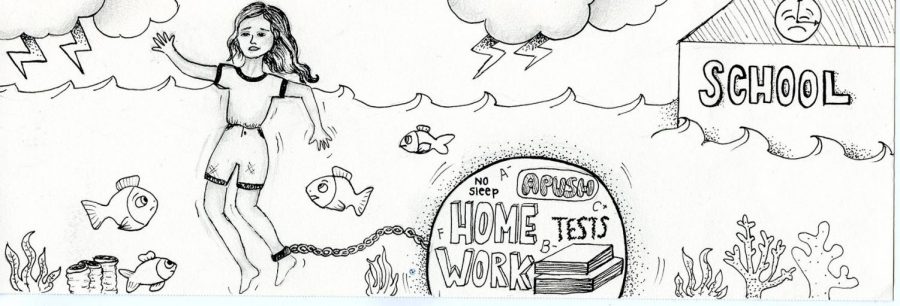Student anxiety prompts reevaluation of homework
May 24, 2019
Slumped in a chair, the typical South student forces their dreary eyes to focus on the blurry words scattered on their Chromebooks’ glaring screen. The PowerSchool logo threatens their mind, already consumed with the longing for their bed just down the hall and the short sleepy serenity it provides before another day of tiresome work. At 1:00 a.m., the student’s body gives in, and they nervously drift towards their bed, abandoning the several uncompleted worksheets littered on their desk.
Sound familiar?
It’s no secret that South students spend too much time completing assignments to maintain their grades. According to an unscientific survey of 323 students conducted by The Oracle, 39.3% of students spend two to four hours everyday on homework and 14.9% spend over four hours. Given the extensive amount of time students spend on homework, The Oracle Editorial Board urges teachers to reduce assignments and communicate with students to enhance the efficiency of their teaching and improve students’ health.
When walking into your first period class and seeing your fellow students wrapped in blankets wiggling to stay awake, sipping espresso, with thick bags under their eyes, it’s apparent students need more sleep. According to Common Sense Media, teenagers require nine hours of sleep each night. However, homework often prevents teenagers such as junior Emily Prillaman from getting enough sleep.
“Everything is dictated by how much homework I have,” Prillaman said. “I barely get any sleep because [of] homework. If I haven’t had enough sleep I will be less focused and feel disconnected and hazy.”
Although staying up until 1:00 a.m. seemingly helps to thoroughly complete assignments, this sleep deprivation leads to excessive fatigue, lack of attention, moodiness, and hunger that sets students up for failure during the school day, according to the American Sleep Association. Hence, the extensive amount of assigned homework contributes to the poor focus and lack of energy in class. A decrease in assignments is essential to afford students the time to get the sleep they need and improve scores.
In addition to affecting physical health, excessive homework negatively affects mental health. According to a resource for information about mental health, psycom.net, 25% of 13- to 18-year-olds have an anxiety disorder. Although there are only so many steps a school can take to reduce the anxiety of their students, placing less of an emphasis on and reducing homework is a way the school can take initiative. With their busy schedules, students often overextend themselves to fit in demanding extracurriculars or sacrifice these liberties to manage their homework.
“I think I will always put homework above a good night’s sleep or above mental health because no matter what, I always get homework done before I can take time for myself,” Prillaman said. “And if I don’t I feel guilty. Everytime I look on PowerSchool I’m always thinking about Naviance and colleges at the same time. It’s always extra added stress because I think of each grade as money signs for scholarships or anything regarding getting into colleges.”
If reducing the amount of assignments proves to be too difficult, The Oracle editorial board proposes communication between students and their teachers when deciding deadlines and providing extensions.Junior Kate Stack emphasises this need.
“Showing compassion and [flexibility] with students occasionally would be helpful,” Stack asserts. “Even things like checking in with the class to ask if they feel the workload is too much at the moment or not would be really appreciated.”
The term “busy work” has been coined by students and staff as being gratuitous, time-consuming assignments which don’t contribute to learning. The Oracle Editorial Board proposes the avoidance of such assignments to allow students more time to study for the classes requiring more focus, and to take much needed time for themselves.
“Sometimes [busy work] can be extra practice, but most of the time it takes away time from actual studying,” Prillaman said.
Although the homework load seems to be increasing, history teacher Ryan Kinsella explains how the amount of homework has decreased through her time at South.
“[AP U.S. History] and other classes in the past did require more homework,” Kinsella said. “As we discuss the conversation of student stress and balance we have lessened the load and I’m not sure that students are aware of that. It goes to show that we are listening to this conversation of stress and wellness and have considered that with what we require in the course.”
The continued advocacy for less homework is needed to ensure students’ health and productive learning. Let’s get to a point where caffeine isn’t necessary and our community eliminates the term ‘busy work.’



